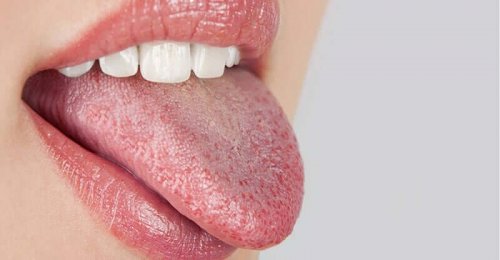Burning Mouth - Why Does It Happen?

You have a burning mouth and you don’t know why. Well, it’s normal under certain circumstances — such as immediately after eating spicy food. However, it’s a chronic problem for some people and the reasons aren’t too apparent.
The medical term for this symptom is glossodynia but most know it as burning mouth syndrome. Estimates indicate that it affects about 5 to 10% percent of the population. It’s a very uncomfortable pathology for those who suffer from it, because the burning sensation spreads all over their mouth.
This syndrome isn’t well known yet; however, we do know it might be related to certain pathological conditions. Thus, it could either be the sign of a deficit of certain vitamins or an allergic reaction.
In today’s article, we’ll explain the reason behind chronic burning mouth syndrome and its causes. We’ll also talk about what you can do about it.
Why does my mouth burn continuously?
As we mentioned above, it’s normal to have a burning sensation in your mouth under certain circumstances. After eating spicy food, for instance. However, this is a localized situation that’s easy to identify and resolves itself on its own.
However, people who experience it for no apparent reason and for a long time may have burning mouth syndrome. As we said above, this syndrome produces the kind of burning that spreads all over the tongue and to every other area of the mouth.
In addition, a person with this condition may experience a decline in their sense of taste. It’s also common for the burning to be accompanied by numbness and dryness. Generally, it happens every day, although it worsens as the day goes on. It may be chronic or intermittent, depending on the case.

Burning mouth syndrome
A burning mouth can be the result of eating spicy foods. However, it may be due to burning mouth syndrome, if it’s recurrent or severe.
The reasons why some people experience it are divided into primary and secondary. It’s considered primary when all the causes for it can be ruled out — the same as with other pathologies.
Likewise, the syndrome is considered secondary when there’s another disease or condition that’s causing it – the use of certain medications, for example. This is because many of them dry your mouth and you might get a burning sensation. In addition, there are other causes such as:
- Fungal infections, such as oral candidiasis
- Certain vitamin and nutritional deficiencies, such as lack of iron
- Situations of stress or anxiety
- Inefficient oral cleaning habits. In fact, some tongue brushes and rinses can be very aggressive and can actually cause it.
- Some metabolic diseases and gastroesophageal reflux disease. The latter happens because the acidic contents of the stomach reach the mouth. Given they’re acidic, they end up irritating the oral mucosa.
You may be interested in: Canker and mouth sores – how to cure them
Burning mouth diagnosis
This syndrome is very difficult to diagnose. As we explained above, the first thing you need to do is rule out all the secondary causes. To do so, you must tell your doctor all your symptoms in detail and list all the medications you take.
In order to reach a diagnosis, the physician will probably request blood tests. This is because this test allows them to check if you have any hormonal or nutritional issues that may be causing it. Similarly, allergy tests are also useful. Sometimes, your mouth burns due to certain types of food.
Likewise, they’ll do cultures or biopsies of the oral tissue to rule out an infection. They must also rule out gastroesophageal reflux, as this is a very common condition.
Treatment for burning mouth

The treatment for burning mouth will depend on what’s causing it. The priority is to treat the underlying pathology, of course. For example, you must learn to manage your anxiety and stress if the condition is a response to them.
In addition, there are some medical treatments such as mouthwashes that contain lidocaine. Also, they may prescribe capsaicin, an analgesic, or antidepressants. The doctors should be able to recommend the best option for each case.
You might like: Coconut Oil for Improving Oral Health
Conclusion
A burning sensation in your mouth could be somewhat pathological if it lasts a long time. Again, the medical term is burning mouth syndrome, and its appearance is usually a side effect of certain pathologies, such as allergies. You must consult your doctor in order to obtain adequate diagnosis and treatment.
All cited sources were thoroughly reviewed by our team to ensure their quality, reliability, currency, and validity. The bibliography of this article was considered reliable and of academic or scientific accuracy.
- Arnáiz-García, M. E., Arnáiz-García, A. M., Alonso-Peña, D., García-Martín, A., Campillo-Campaña, R., & Arnáiz, J. (2017). Glosodinia o síndrome de boca ardiente. Medicina General y de Familia, 6(4), 172–175. https://doi.org/10.24038/mgyf.2017.039
- Glosodinia (“síndrome de boca ardiente”) – familydoctor.org. (n.d.). Retrieved December 3, 2019, from https://es.familydoctor.org/condicion/sindrome-de-ardor-en-la-boca/
- Aravindhan R, Vidyalakshmi S, Kumar MS, Satheesh C, Balasubramanium AM, Prasad VS. Burning mouth syndrome: A review on its diagnostic and therapeutic approach. J Pharm Bioallied Sci. 2014;6(Suppl 1):S21–S25. doi:10.4103/0975-7406.137255
- Bookout GP, Short RE. Burning Mouth Syndrome. [Updated 2019 Mar 9]. In: StatPearls [Internet]. Treasure Island (FL): StatPearls Publishing; 2019 Jan-. Available from: https://www.ncbi.nlm.nih.gov/books/NBK519529/
- Feller L, Fourie J, Bouckaert M, Khammissa RAG, Ballyram R, Lemmer J. Burning Mouth Syndrome: Aetiopathogenesis and Principles of Management. Pain Res Manag. 2017;2017:1926269. doi:10.1155/2017/1926269
This text is provided for informational purposes only and does not replace consultation with a professional. If in doubt, consult your specialist.








